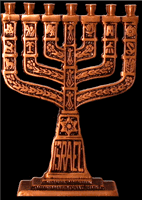
Antiochus also ordered that a pig be sacrificed on the sacred altar and erected an image of the Greek god Zeus as the new point of worship in the Temple! Antiochus insisted on being called "epihanes" (god manifest), enough to repulse any religious Jew. The Jewish community soon came up with an appropriate reflection of their feelings. Instead of calling him Antiochus Epiphanes they made a play on words, and called him "epimanes" (crazyman)!
This brutal attack on the Jewish people and their faith would not go unanswered for long. The mumurings of revolt were heard in Judea and were crystallized in a small village called Modi'in. Syrian troops entered this town to enforce their assimilation policy. The soldiers planned to erect a temporary altar to the false gods and force the populace to participate in their religious cerimony - the highlight of which was eating the flesh of swine!
Living in this village was an old, faithful priest named Mattathias and his five sons. When the Seleucid soldiers chose him to lead the pagan ceremony, Mattathias and his sons reacted with set-apart indignation. Enough was enough! They killed the soldiers and started a revolt against the oppressors. One of the sons, Judah, rose to leadership and was nicknamed "Maccabee" (the hammer).
Overwhelmingly outnumbered and under-supplied, the armies of the Maccabees turned to more creative devices. Relying on their knowledge of the hill country and employing guerrilla warfare, the Jewish forces met with surprising success. Spurred on by their firm conviction that the Elohim of Yisrael was true and faithful, the Maccabees proved that the impossible could happen. In the Hebrew month of Kislev (around december on the pagan calendar) they drove out the Syrians and recaptured the Temple in Jerusalem.
They faced the sober task of restoring the Temple to the true worship of Yahveh. The Temple compound was in shambles, desecrated by the idolatry of the Syrians. The Maccabees and their followers quickly cleansed the altars and restored the set-apart furnishings.
Of particular importance to them was the broken menorah, symbolizing the light of Yahveh. They restored it and attempted to light it, but there was a problem.
Jewish tradition recounts that as they searched for some specially prepared oil, they found only enough to burn for one day. The priests knew it would take at least eight days for new oil to be produced. What to do?
They decided it was better to light the menorah anyway; at least the light of Yahveh would shine forth immediately. To their amazement, the oil burned not only for one day, but for eight days until additional oil was available!
The Temple was restored and rededicated to the glory of the Elohim of Yisrael and an eight-day festival was established. It is called Chanukkah (Hebrew for Dedication). Every year, starting on the twenty-fifth of Kislev, the Jewish community recalls the two-fold miracle: the miracle of the oil as well as the miraculous military victory.
Some people may question my inclusion of Chanukkah with the "scriptual" holy days. It is not mentioned in the feasts of Leviticus 23. However, the Tanakh reveals that Chanukkah is clearly predicted in later prophetic writings.
The vision given to the prophet Daniel is an amazingly detailed description of the events surrounding Chanukkah. As he describes the coming kingdoms that would have impact on Yisrael, Daniel writes:
The shaggy goat is the king of Greece, and the large horn between his eyes is the first king. The four horns that replaced the one that was broken represent four kingdoms that will emerge from his nation but will not have the same power (Daniel 8:21-22).
This is a graphic description of the rise of the Hellenistic empire with its strong leader (the large horn). Alexander the Great was indeed broken by his early death. His four generals (the four horns) split the kingdom between themselves. Yet there were even more specific details given by Daniel:
In the latter part of their reign, when rebels have become completely wicked, a stern-faced king, a master of intregue, will arise. He will become very strong, but not by his own power. He will cause astounding devistation and will succeed in whatever he does. He will destroy mighty men and the set-apart people. He will cause deceit to prosper, and he will consider himself superior. When they feel secure, he will destroy many and take his stand against the prince of princes. Yet he will be destroyed, but not by human power. (Daniel 8:23-25)
Accoring to the word given Daniel, the focal point of this Hellenistic kingdom would be a leader who, by a power not his own, would persecute Jewish people. He would magnify himself through his brutal attacks and words, as was the case with Antiochus who called himself Epiphanes! Yet Yahveh promised that this evil ruler would be broken without human agency.
The fanatical persecution by the Seleucids is predicted along with the miraculous deliverance by Yahveh! The miracle of Chanukkah is mentioned in Hebrew Scriptures with such detail that some liberal scholars have suggested that Daniel was writting after the fact and not prophetically (see Walvoord's comments on Daniel pg.16 and following). What an important time to understand! What a great celebration Chanukkah should be!
No comments:
Post a Comment